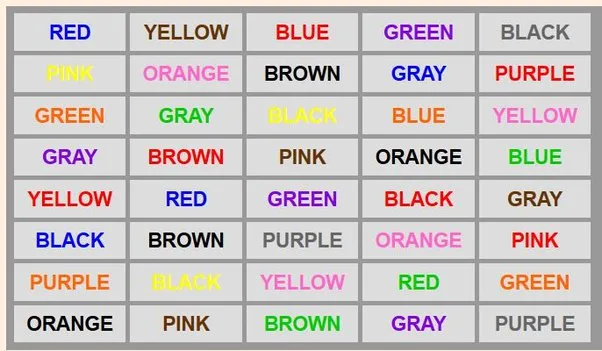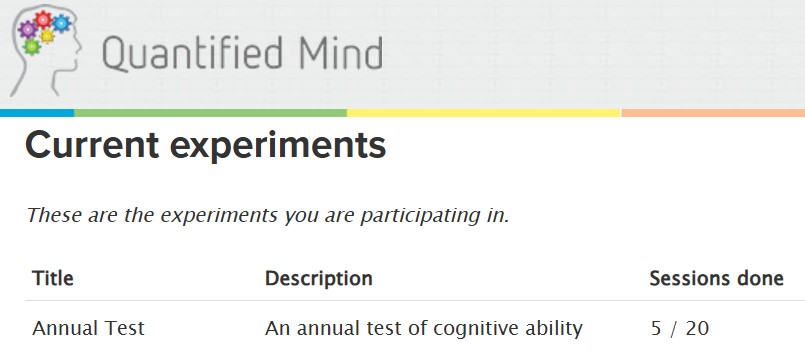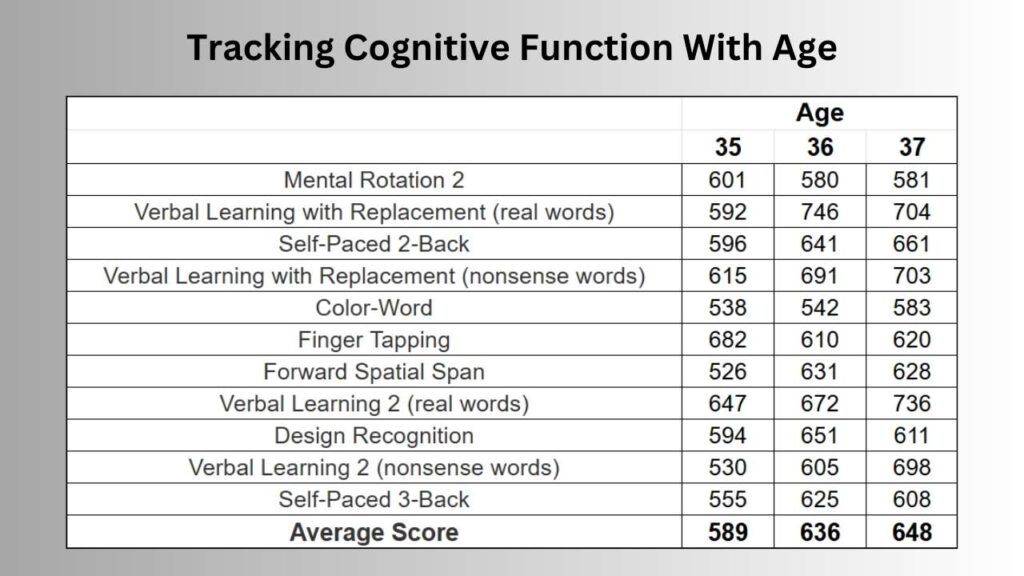When it comes to monitoring our health and fitness, it’s easy to focus only on physical well-being and neglect the mental aspect. We might not want to admit it, but cognitive function will decline slowly throughout out lifetimes and makes it equally as important to track over time.
With that in mind, I sought to find a way to measure cognitive function year to year. The solution I found was a battery of free online tests.
The Online Test
Some of the tests I first came across are only designed for true impairment, such as dementia. For my purpose I was seeking tests which would still have value to someone in their 30’s and 40’s.
Through prior research, I was already familiar with Quantified Mind, a platform that has a variety of scientifically validated cognitive tests. One well-known example of this is the Stroop Test, seen below. Participants must identify the colour of the word, while ignoring what the word itself may say.

However, to assess the whole spectrum of cognitive function requires more than one test. I opted for a series of tests named “Quantified Mind IQ v3”. This covers 11 different tests, including mental rotation, verbal learning, short and long term memory, and pattern recognition.
How To Take The Test
To complete the test series, follow these steps:
- Create an account at quantified-mind.appspot.com
- Sign in and click “Design an Experiment”
- Name and describe your experiment (I simply called mine “Annual Test”)
- With the Focus drop-down set to “Special”, select “Quantified Mind IQ v3”
- Scroll to the bottom and click “Go”
- Find your experiment under Current experiments and click “Take tests”

Be aware that the tests take around 25 minutes and must be completed in a single session. For the most accurate results, take the tests when you’re well-rested and mentally alert.
What Do My Results Mean?
As noted in the website FAQs, “the score summarises multiple aspects of each test into a single number, where higher is better”. The scores are absolute, so while it does mean you can compare yourself to friends and family, the key is tracking your own score over time.
With 11 different tests, your results will likely highlight areas where you are stronger or weaker than the average person. The tests are also designed so that practice does not have much effect, meaning you can’t game the system by taking the test a hundred times.
Here’s an example from my latest results:
- Verbal Learning Recall: 736
- Colour-word (The Stroop Test): 583
The Verbal Learning Recall test presents a list of words, requiring you to recall them after 10–15 minutes. Research has shown that impairments in this ability can detect dementia up to seven years before a formal diagnosis [1].
Meanwhile, the Stroop test is able to measure both executive function, selective attention and cognitive inhibition. Executive function is particularly important and is something that peaks in someone’s 20’s and 30’s and shows signs of decline in older adults [2].
It may be that I am naturally better at word recall than an executive function task. The true value comes in tracking your scores as you age.
Tracking Over Time
Cognitive function tends to peak between the ages of 25 and 35, after which a gradual decline is expected. Establishing a baseline score allows for meaningful comparisons and helps in detecting early signs of cognitive impairment.
Below are my individual and average scores from the past three years. Some scores have improved while others have declined, but the overall trend is positive. It’s worth noting that minor variations in scores may even occur in testing on consecutive days. For that reason it may be more beneficial to test every 3–6 months in order to identify any real trends.

In conclusion, monitoring cognitive function can provide early warning signs of decline, just as tracking physical fitness helps in tracking overall health.
Using the scientifically validated tests from Quantified Mind allows for meaningful self-assessment and long-term tracking. Whether you’re looking to optimise mental performance or detect early cognitive changes, these tests offer valuable insights into your brain’s health.
[1] The trajectory of cognitive decline in the pre-dementia phase in memory clinic visitors: findings from the 4C-MCI study, 2015, Hamel et al.
[2] Executive function abilities in cognitively healthy young and older adults—A cross-sectional study, 2023, Idowu, Szameitat

